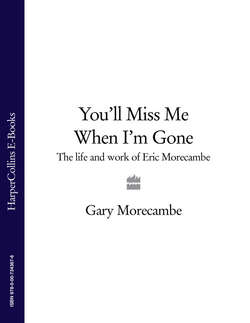Читать книгу You’ll Miss Me When I’m Gone: The life and work of Eric Morecambe - Gary Morecambe - Страница 17
‘Certainly Eric returned often enough to the north…but it never really felt like Morecambe was his home.’
ОглавлениеA couple of years ago, while in Morecambe filming for the BBC series Comedy Map of Great Britain, I had the honour and pleasure of being taken on the official ‘Eric Morecambe Tour’. We visited all the significant sights from Eric’s youth. It was wonderful, though the strange thought hit me that the last time I did the tour was with Eric himself, decades before it even existed as a tourist walk. Back in 1968 or 1969, while staying with my grandparents, my father said he’d take me on a stroll down memory lane. He was very helpful, pointing out this and that significant building from his childhood. We even passed what had once been the cinema where he’d chucked fruit and veg down from the balcony onto bald-headed targets, and the address where he’d trundled off to for those music and dance lessons. Then there were the schools, the shops, and even the optician’s where he’d been eyetested for his first pair of glasses. What struck me at the time, but much more now decades later as I write
this book, is how dispassionate he was about it all. He didn’t dawdle lost in reminiscence. There was nothing rose-tinted about his memories: it was all quite brisk, almost as if he was explaining what had happened to someone else he had known incredibly well, but definitely not his own personal history.
Then suddenly it occurred to me that he was someone else back then, so the third-person approach to his childhood was quite comprehensible. John Eric Bartholomew had shed his identity to reveal the comic genius Eric Morecambe. And at the same time, and on that same walk, I came to notice how diluted his northern accent had become. He had more what writer-comedian Ben Elton calls his transatlantic accent, something both he and Ernie were especially fond of displaying in their musical numbers. His accent had become quite hard to place: certainly pure Lancastrian didn’t immediately spring to mind.
When I was a boy and Eric’s career was just starting to blossom, his northern tones—his birth signature—were very strong. ‘Grass’, ‘bath’, and ‘laugh’ had the same vowel sound as ‘ass’, and ‘look’, ‘book’, and ‘cook’ rhymed with the American way of saying ‘duke’. His parents would retain these pronunciations for the rest of their days (understandably, considering it was where they lived their whole lives), but I sensed with my father that he was a man of the planet, not a specific country, county, or town. In a way it gave him a sense of mystery, for while northern traits clung on in his accent, they were more evident in his delivery of a funny line than in everyday conversation. If anything, Ernie retained his Yorkshire accent much more than Eric did his Lancastrian one, though both had taken on that same transatlantic twang.
